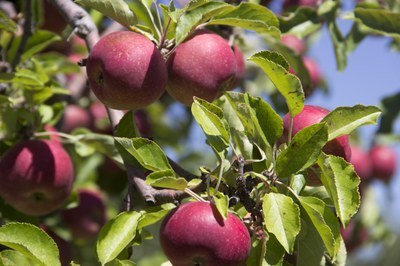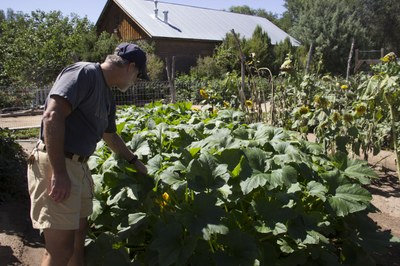
Step into the Past
The Botanic Garden’s Heritage Farm Gives Visitors a Chance to Experience the Almost-Lost Art of Heritage Farming.
09/28/2016 - Jon Stewart, ABQ BioPark Curator of Plants, recalls a distinct burst of flavor on his tongue after biting into of one of his uncle’s home-grown Missouri peaches growing up. But, he says, modern agriculture has stolen a lot of that flavor and today’s fruits and vegetables are “rock hard and dull.”
That’s one of the reasons he’s passionate about the garden’s Heritage Farm, which boasts an array of “heritage” crops.
“The biggest advantage of heritage crops is that they actually taste like something,” Stewart says. “Heritage crops were grown for flavor whereas modern crops are grown to ship.”
Open pollinated and passed through generations, heritage crops were produced on a small scale by people who lived off the land. Now, after a shift to large-scale agriculture, many of those crops are on the brink of disappearing.
Located in the back of the Botanic Garden, the Heritage Farm boasts an array of crops, many of which are heritage—this year’s harvest includes beans, sweet peppers, tomatoes, sunflowers, okra, cucumber, gourds, strawberries, raspberries, black berries, eggs, pears and chile.
Stewart says the purpose of the farm is to educate people about the origins of their food and also about the historical context of heritage crops.
“People have lost a connection to where their food comes from. As modern humans living in the United States, people don’t understand where their food originates and how much work it takes to produce it. The heritage crops are a window to the past of what it used to be.”
The farm isn’t just a destination for human visitors—the fruits and vegetables attract a variety of animals. Sandhill cranes like to feast on the red chile; other visiting wildlife includes black tailed weasels, porcupines, coyotes, rock squirrels, raccoons and assorted birds.

The event also includes a variety of educational activities, wagon rides and music. Grape juice and apple cider vinegar are also available for purchase. This year, the day event is followed by a four-course Harvest Dinner. Each course is paired with a Tractor Brewery beer, and the event takes place in the orchard, with community-style seating.
“This is a fun event where people get to actually watch us make the cider, from washing the apples to pressing the juice and pouring it into the jug,” says Stewart. “It has grown beyond our wildest expectations and is a great chance for the community to learn more about our Heritage Farm and heritage crops.”
Story: Tina Deines
